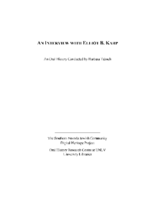Search the Special Collections and Archives Portal
Search Results

Transcript of interview with Thelma Coblentz by Judith Chavez, February 17, 1980
Date
Archival Collection
Description
On February 17, 1980, Judith Chavez interviewed Thelma Coblentz (born 1911 in New Jersey) about her experiences in Southern Nevada. Coblentz first talks about her move to Lovelock, Nevada, where her husband provided medical care as one of the first physicians in the small town. She later talks about her move to Las Vegas and some of the services she helped to provide at Nellis Air Force Base. Coblentz later describes Downtown Las Vegas, specifically the development of the casinos and shopping businesses. She later talks about the rainstorms and dust storms that the city would experience before recalling some of the entertainers who would perform on the Las Vegas Strip. The interview concludes with a discussion on the first physicians in Las Vegas and the increasing population of the city.
Text

Transcript of interview with Irene Doty by Jackie Ogden, March 20, 1977
Date
Archival Collection
Description
On March 20, 1977, Jackie Ogden interviewed Irene Doty (born 1914 in Dangerfield, Texas) about her life in Southern Nevada. Doty first talks about the first casino properties and restaurants in Las Vegas along with some of the other businesses and operations of the area. She also describes some of her experiences as a justice of the peace, conditions during World War II, and the clothing fashion of the time. Doty also talks about some of her experiences in Goodsprings, Nevada, and about her experiences as a juror and potential juror in several murder trials. The interview concludes with a discussion on housing development and gambling in Las Vegas.
Text

Transcript of interview with Patricia Mulroy by Stefani Evans and Claytee D. White, January 03, 2017
Date
Archival Collection
Description
Patricia Mulroy served Las Vegas as the general manager of the Las Vegas Valley Water District from 1989 to 2014. She served the state of Nevada as the general manager of the Southern Nevada Water Authority from 1993 to 2014. Patricia helped to build the Authority, and saw the state through the devastating drought of the Colorado River. Patricia was born in Frankfurt, Germany on February 24, 1953. As a young girl, she lived in several different countries, but always felt that the United States was her home. Her experiences abroad fed her to develop a fascination with government work and state service. She arrived in Nevada in 1974 to attend UNLV. In 1989, Patricia became the general manager of the Las Vegas Valley Water District. She entered the field at a tumultuous time, facing the drought of the Colorado River and tension within the districts. She pioneered the Water Authority, which revolutionized Southern Nevada’s water rights system and allowed the districts to deal with the issue cooperatively. She worked with other Southwestern states and Mexico to support Las Vegas and Nevada through the drought. Patricia retired in 2014, but has chosen to remain active in politics and business. She is currently working with the World Bank in China on the World Economic Forum. She is also a nonresident Senior Fellow at the Brookings Institute, a faculty advisor for the Desert Research Institute, and a board member of the Wynn Board of Directors.
Text

Transcript of interview with Rory Reid by Stefani Evans and Claytee White, July 13, 2017
Date
Archival Collection
Description
Rory Reid works in the Downtown Las Vegas building fully tattooed with a mural depicting a hand holding a bouquet of flowers of which the glowing central bloom is half brain and half heart. The story behind the mural is essential to understanding why the oldest of Landra and Harry Reid’s five children loves coming to work. Born in Alexandria, Virginia, he arrived in Las Vegas as a six-month-old with his parents and led a story-book life in the Reid house on Gretel Circle, down the street from Hansel Circle and right off Lilliput Lane. After attending Doris Hancock Elementary School, James Cashman Junior High School, and Ed W. Clark High School, he served a church mission in Argentina and studied international relations and Spanish and then law at Brigham Young University before returning to Las Vegas and joining Lionel Sawyer and Collins law firm. In this interview, Reid talks about administrative law, about leaving the firm to become an executive with Lady Luck Gaming Corporation, serving as Nevada Democratic Party chair for two years, and returning to Lionel Sawyer and Collins in 2000, where he remained until 2014. He shares his motivations for running for the District G seat on the Clark County Commission in 2002, and talks about the political climate in which he took office in 2003, a few months before fellow Commissioners Dario Herrera; Lance Malone; Erin Kenny, and chair Mary Kincaid Chauncey were indicted on federal charges following Operation G Sting. Following these highly public arrests, Reid focused on restoring faith in local government. In 2010, after two terms as Clark County Commissioner and Commission chair, Reid ran for Governor of Nevada as the Democratic nominee against Brian Sandoval. In that election, as Reid puts it, "the voters told me to do something else with my life," and he returned to his law practice. However, in June of 2014, his dear friend Jim Rogers passed away. The day after Rogers died Reid discovered that he was named co-trustee of Rogers's estate, along with his widow, Beverly. Reid and Beverly Rogers together founded The Rogers Foundation to be the primary advocate for public education in Nevada. The Rogers Foundation is housed in Downtown Las Vegas in the building tattooed with the bouquet. The mural-the Wall of Understanding-is The Rogers Foundation's answer to political calls for "building a wall" and a show of solidarity with the students they serve, many of whom are undocumented immigrants or have undocumented immigrant family members. For the man who helped restore the reputation of Clark County government and who emphatically declines to run for further public office, fulfilling the mission and the work of The Rogers Foundation is one of his greatest joys-along with his family; his beagle, Oakey; and watching Liverpool compete in the English Premier League (especially when Liverpool plays his brother's favorite team, Manchester United).
Text

Transcript of interview with Ike Lawrence Epstein by Barbara Tabach, August 24, 2017 and February 2, 2018
Date
Archival Collection
Description
Ike Lawrence Epstein’s office at the recently opened UFC headquarters is sunlit and handsomely decorated. A black and white photo taken by the famous British photographer David Bailey of the Kray brother adorns the wall. Lawrence, as everyone knows him, is the son of Kenny Epstein and Donna Goldstein. He was born, in 1966, and raised in Las Vegas. He attended Vanderbilt University (BA 1989, JD 1992) and then returned to live full time in Las Vegas with his law degree in hand. In addition to being COO of the UFC, he is active in the family business, the El Cortez Hotel and Casino. In this oral history, Lawrence recalls his grandparents, their careers in Las Vegas, and his youthful favorite holidays being Passover and Thanksgiving. He became a bar mitzvah in Israel, a tradition he continues with his own children with Michelle Epstein. Lawrence serves the community as a board member of Meadows School and on the Stadium Board. As an executive with UFC [Ultimate Fighting Championship], Lawrence observes the overall magnitude of sports in Las Vegas in 2017, how it came to this point with professional sports, and what he envisions as the future possibilities of the city as an international sports destination.
Text

Transcript of interview with Gene Greenberg by Barbara Tabach, February 12, 2015
Date
Archival Collection
Description
In 1976, Gene Greenberg decided to accept a job transfer with Donrey Media Group and relocated from Laredo, Texas to Las Vegas. Las Vegas was comfortable fit and for the next 30 years, he primarily worked in television ad sales. He rose to become executive vice president and general manager of KVBC-TV. Significant to Gene’s ties to Las Vegas have been his ties to the Jewish community. This oral history includes reminiscences of connecting with the Jewish community and meeting many of the Jewish leaders through Young Leadership, Jewish Federation, and being on the board for Temple Beth Sholom. The most poignant aspect to his Jewish roots is the survival of both his parents during Holocaust. Both Helen and Abe Greenberg were from Lodz, Poland and interred in concentration camps. Gene is a frequent presenter of their story for his commitment to Holocaust education and as a member of the next generation. Gene and his wife Melanie both spent their childhoods in Kansas City, Missouri and are graduates of the University of Missouri-Kansas City. They married in 1970 and have three children: Sari Mann, Elissa Burda, and Jaron Greenberg.
Text

James L. Hogan interview, March 11, 1978: transcript
Date
Archival Collection
Description
On March 11, 1978, collector Patty L. Baratti interviewed James Hogan (born April 6th, 1909 in Winton Place, Ohio) at his home in Las Vegas, Nevada. In this interview, Hogan talks about his time working with the telephone company in Arizona and moving to Las Vegas, Nevada. He discusses his time working on grazing rights and cattle ranching in Nevada and how planning went to ensure that farms were able to have land to graze their animals. He speaks about dealing with farmers, corporations, and the government and the frustrations he had to deal with before there were set laws about grazing. He also discusses the change from mainly family farms in Nevada to corporations owning much of the farmland.
Text

Transcript of interview with Marie Horseley by Suzanne Becker, June 13, 2007
Date
Archival Collection
Description
Twenty years after her birth in Utah in 1924, Marie Horseley met and married her husband who was an engineer for the Union Pacific Railroad. They settled in Las Vegas, his home town and soon purchased a home for $9800 in the new John S. Park neighborhood. Sixty years later Marie, twice a widow, remains in the home. Up the street four doors, one of her granddaughters lives with her three children. Marie recalls the new housing development that appealed to railroad workers. The roads were dirt and there were no streetlights, but soon a community blossomed. Marie is a self-described quiet resident; her life was about raising her three daughters and being a member of the LDS church. However, she knew everyone on her street no matter their religious affiliation. Today the businesses are gone. Homes have changed appearances over the years as owners have changed. Ethnic diversity is apparent and the sense of community closeness has slipped away for her. Yet she loves her place there, feels safe and secure. When asked about the ides of John S. Park being designated a historic district, she is not all that wowed by the idea of restrictions that might be included in that. Nevertheless, she has no intention of relocating from the comfort of the place she has called home all these years.
Text

Transcript of interview with Robert D. "Bob" Fisher by Barbara Tabach, January 8, 2015
Date
Archival Collection
Description
Robert D. "Bob" Fisher is a Las Vegas, Nevada broadcast personality and lobbyist. He was born in Minneapolis, Minnesota and moved to Las Vegas in 1994 when he was hired to be the founding president and CEO of the Nevada Broadcasters Association (NVBA). During his 22 years as head of the NVBA, he produced and hosted Observations, a public affairs program broadcasted on radio and television throughout the state of Nevada. Soon after, he began producing and hosting the only weekly live television program about diabetes in the United States; in 2015 his weekly live radio program The Diabetes Show was the only one of its kind to be aired over commercial radio in the U.S. Fisher helped bring the AMBER Alert program to Nevada in 2003, and served as its chairman and coordinator for ten years. His other lobbying successes include the classification of certified broadcasters as First Responders and the elimination of Broadcaster Non-Compete contracts in 2013. He served on the Nevada Homeland Security Commission for 13 years, the Nevada Crime Commission, and the Governor's Defense Base Closure and Realignment Commission. Fisher is a founding clergy member of Midbar Kodesh Temple in Henderson, Nevada and served as its cantor for over a decade. After his retirement from NVBA at the end of 2014, he established Bob Fisher Weddings to provide his services as a wedding officiant. In this interview, conducted shortly after his retirement from NVBA, Fisher discusses his childhood in Twin Cities, and the large role Judaism played in his upbringing. He speaks at length about his involvement with United Synagogue of Conservative Judaism over the years, including as regional director of the United Synagogue Youth Far West Region, which took him from Minnesota to California. He talks about his time in Los Angeles, and later, about his life in Las Vegas, including his broadcasting career as well as involvement with Midbar Kodesh Temple.
Text

Transcript of interview with Elliot B. Karp by Barbara Tabach, December 17, 2014
Date
Archival Collection
Description
Interview with Elliot B. Karp by Barbara Tabach on December 17, 2014. In this interview, Elliot Karp discusses growing up in a culturally Jewish household in New York and becoming more observant in his teenage and college years. He decided, after a trip to Israel and a year in a rabbinical program, that he wanted to be a "Jewish professional" with a focus on social work and community organizing, and attended a Master's program at Brandeis University. Karp goes on to talk about his work for the Jewish Federation in Ohio and Pennsylvania, and being recruited to come to Las Vegas. He talks about the challenges in the Las Vegas Jewish community and the Jewish Federation's role as an umbrella organization to partner with other agencies to grow and sustain a robust Jewish community in Southern Nevada.
On October 6, 1955, Elliot Karp was born in Mineola, New York to parents of East European heritage who identified as culturally Jewish. As a teenager, Elliot felt the calling to become kosher, balancing this practice with household norms that were not as strict. He eventually became shomer Shabbat just after enrolling at State University of New York at Stony Brook, where he majored in Political Science. After graduating from SUNY, Elliot spent a year living in Israel considering a path in rabbinical studies. By the end of his time, he decided on a different, yet related path, and registered as a graduate student in Brandeis University's School of Jewish Communal Service, on fellowship from Council of Jewish Federations. After graduating, Elliot moved to Columbus, Ohio to work for the Jewish Federation, focusing on fundraising, but was exposed to many different operational areas of the organization. After three years, Elliot was recruited to the Philadelphia office as its director of leadership development. He then left the Federation to work in development at Brandeis University, but after two years, returned to the Federation as the Cincinnati office's chief development officer. In 2008, Elliot received a call to take his highly cultivated leadership and fundraising skills to another Federation office: Las Vegas. After much consideration, he took the job - and challenge - as the office's new chief executive officer. Since then, Elliot has done much to promote communication, coordination and collaboration within the local Jewish community and beyond, through relationship building and successful fundraising efforts. His ultimate desire is to expand funding for programs that get more people involved in Jewish life - while also empowering community members define what a Jewish life means for them.
Text
